Why Cleaning Your Grill Matters for Flavor and Safety
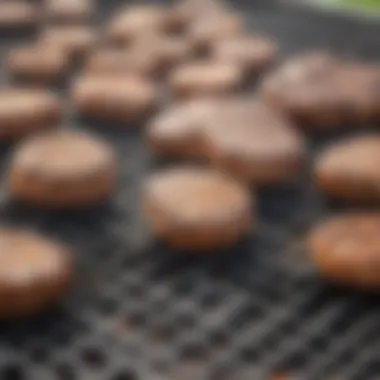
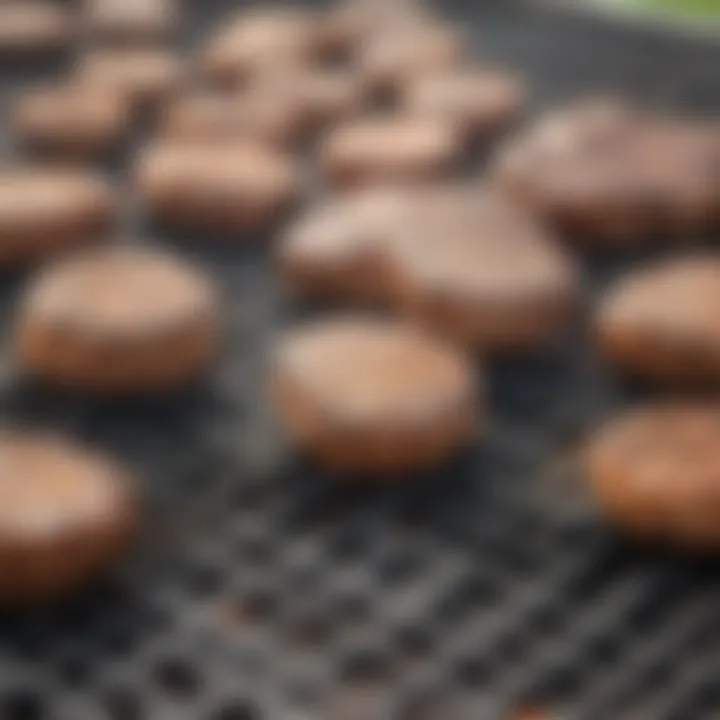
Intro
Cleaning your grill after each use is not just a matter of aesthetics; it is a crucial aspect of maintenance that directly impacts the quality of your food and the longevity of the appliance. Skipping this essential step may lead to undesirable consequences, including poor flavor, health risks, and a shorter lifespan for your grill. The act of cleaning ensures that accumulated grease, food residues, and carbon buildup do not compromise your future grilling activities.
This article will outline key points concerning the importance of grill cleaning, dive into effective techniques for various grill types, and highlight the tools needed for optimal results. Understanding these aspects can significantly enhance your grilling experience and promote healthier cooking practices.
Understanding the Need for Grill Maintenance
Cleaning your grill is not merely a chore but a crucial aspect of grill ownership. Regular maintenance holds significant importance for various reasons, including health, flavor enhancement, and longevity of the appliance. Each of these aspects can greatly affect both the cooking experience and the outcome of meals prepared on your grill.
Health Implications
Grilling often involves cooking meat, which can leave behind harmful residues. If these residues are not cleaned, they can harbor bacteria and potentially cause foodborne illnesses. For example, leftover grease, charred bits, and other debris can become breeding grounds for pathogens. To mitigate this risk, it is critical to employ effective cleaning techniques after each use. Ensuring that your grill is free from food particles helps maintain a safe cooking environment for everyone.
In addition, when residue burns off during future grilling sessions, it may produce harmful smoke or fumes. This can contribute to both health issues and unwanted flavors in subsequent meals. Therefore, maintaining a clean grill is essential to promote a healthy living space.
Impact on Food Flavor
The quality of food cooked on a clean grill is notably superior to that from a dirty one. Residues from previous meals can impart unpleasant flavors. For instance, if you grilled salmon last week and did not clean your grill properly, the next time you prepare vegetables or chicken, the flavors may become muddled or tainted with old fish residue. A clean surface allows for proper searing and provides the characteristic grill marks that many food lovers appreciate.
Moreover, the buildup of grease can cause flare-ups during cooking, leading to charring that can affect flavor. By maintaining a clean grill, you ensure that each ingredient is showcased in its best form, ultimately elevating your culinary experiences.
Enhancing Grill Longevity
A well-maintained grill extends its lifespan significantly. When you neglect cleaning, grease and debris can corrode essential components. For instance, burners can become clogged, and grates can rust more quickly when they are covered in residues. Regularly cleaning your grill can prevent costly repairs or replacements in the long run.
In addition, investing in regular maintenance enhances the performance of your grill. By keeping the components clean, you maintain optimal heat control, ensuring that your food cooks evenly. This practice not only keeps your grill in excellent condition but also contributes to a more enjoyable cooking experience.
By recognizing the importance of grill maintenance, you set the stage for both safer and more flavorful meals, while also taking steps toward extending the useful life of your grill. Understanding these principles will ultimately enhance your outdoor cooking adventures.
Immediate Cleaning Techniques
Immediate cleaning after grilling plays a crucial role in maintaining grill hygiene and functionality. The cleansing process should not be seen as a chore but as a necessary practice to ensure that your grill remains in good condition and your food tastes fresh. Immediate cleaning techniques help prevent the built-up residue that can lead to health issues and alter food flavor. By adopting some simple habits post-cooking, you can achieve better results in your grilling experience.
Post-Cooking Scraping
One of the most effective immediate cleaning techniques involves post-cooking scraping. After you finish grilling, while the grill is still warm, use a grill brush to scrape off food debris that may cling to the grill grates. This process physically removes particles that can harbor bacteria or contribute to unpleasant flavors in future meals.
Benefits of Post-Cooking Scraping:
- Hygiene: Reduces the risk of foodborne illnesses by eliminating bacteria from previous cooks.
- Flavor Preservation: Keeps flavors intact for your next grilling session, as old burnt residues can contaminate fresh food.
- Ease of Cleaning: It is less time-consuming to clean when the residue is still warm and pliable.
When scraping, choose a brush with stainless steel bristles to avoid any metal filings becoming dislodged. This method also prepares your grill for the next use, enhancing efficiency.
Using Hot Water and Soap

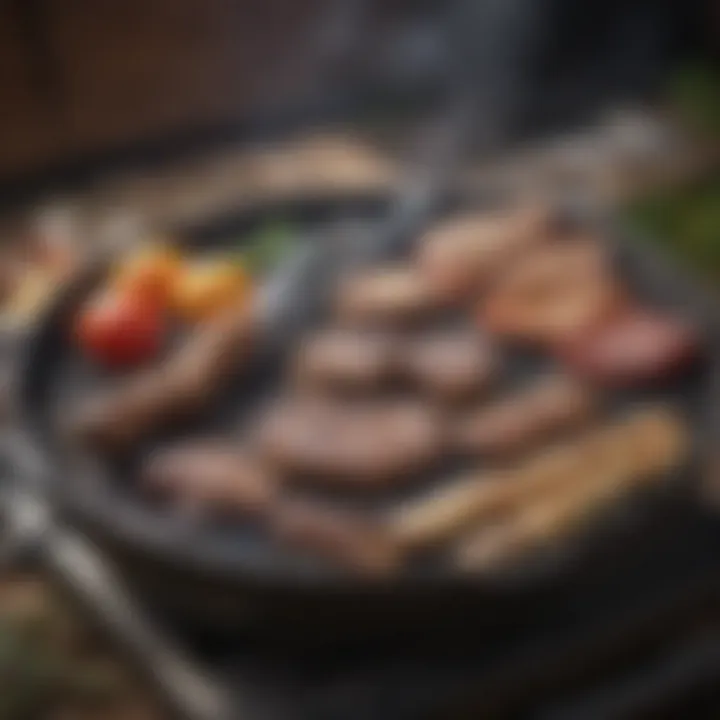
Following the scraping, another crucial technique is using hot water and soap. This method should be applied after the grill has cooled down but before excessive grime builds up.
When you are ready, dilute some dish soap in hot water and use a sponge or cloth to wipe down the grates, burners, and any removable components. Here are a few considerations for this technique:
- Effectiveness: Hot soapy water breaks down grease and grime much more effectively than cold water.
- Material Caution: Always check that your soap is compatible with the specific material of your grill components to avoid corrosion or damage.
- Detailing: Pay attention to any hard-to-reach areas where grease may accumulate; a small brush can assist in this detailed cleaning.
Once you have finished cleaning, rinse everything thoroughly with water to remove soap residues. Ensure that all parts are dried properly to prevent rusting.
"Proper cleaning techniques not only maintain the grill but also safeguard against health concerns and enhance the overall cooking experience.”
Implementing these immediate cleaning techniques contributes significantly to the upkeep of your grill. Both post-cooking scraping and using hot water and soap are essential steps that ensure safety and longevity of your grilling apparatus.
Deep Cleaning Protocols
Deep cleaning your grill is not just a recommendation; it is a necessity to maintain its performance and ensure food quality. Over time, grease and food debris build up. This impacts both functionality and the flavors of your meals. A systematic approach to deep cleaning enhances safety, efficiency, and extends the life of your grill.
Disassembling the Grill
The first step in deep cleaning is disassembling the grill. Before you begin, make sure the grill is completely cool and disconnected from any power source or gas supply. Remove the grates and burners carefully. Take note of how these parts fit together to ease reassembly later.
Disassembling allows for thorough cleaning of all surfaces. It prevents leftover residues from hiding and promotes better functionality. Inspect the parts for damage as well, as early detection can prevent costly repairs. Document any irregularities.
Removing Burners and Grates
Once the grill is disassembled, focus on removing the burners and grates. The grates are generally the most soiled parts, often coated in grease and carbon from cooking. Soak them in a mixture of hot water and dish soap for several hours to loosen the grime. Scrub gently to avoid scratching the surfaces.
Burners need meticulous attention too. Residue can clog the openings, causing uneven cooking. Use a soft brush or cloth to clean them carefully. Pay attention to their alignment; if not placed correctly, burners might not work effectively. This task may take time, but a clean burner ensures better flame control and cooking.
Cleaning the Exterior
Cleaning the exterior of the grill is equally important. Over time, dirt and grime collect on the outside, affecting its appearance and function. Use a non-abrasive cleaner and a soft cloth to wipe down the entire surface. If your grill is stainless steel, consider using a special cleaner designed to maintain its shine.
Don't forget about the wheels and legs, as dust and grime accumulate there too. This ensures not just functionality but also enhances the overall aesthetic of your grill. Keep in mind that maintaining the exterior can prevent rust and other forms of degradation.
Cleaning Tools and Supplies
Cleaning your grill properly requires the right tools and supplies. Using appropriate equipment ensures effective cleaning, maximizing the longevity of the grill and improving cooking efficiency. Without proper tools, cleaning can become ineffective or lead to damage. It is essential to select tools based on the type of grill you have, as not all grills require the same cleaning modalities.
Brushes and Scrapers
Grill brushes and scrapers are fundamental in the cleaning process. The primary purpose of these tools is to remove food particles, grease, and residue from the grates and burners. A high-quality grill brush typically has stiff bristles made from materials like stainless steel or brass that can effectively dislodge stubborn grime.
When selecting a grill brush:
- Look for bristle-free options to avoid shedding bristles that can end up in food.
- A scraper attachment can also be beneficial for harder surfaces.
- Choose a brush with a long handle to keep a safe distance from the heat.
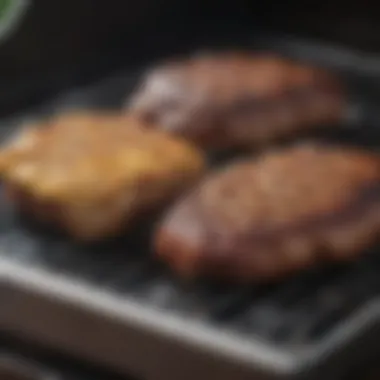
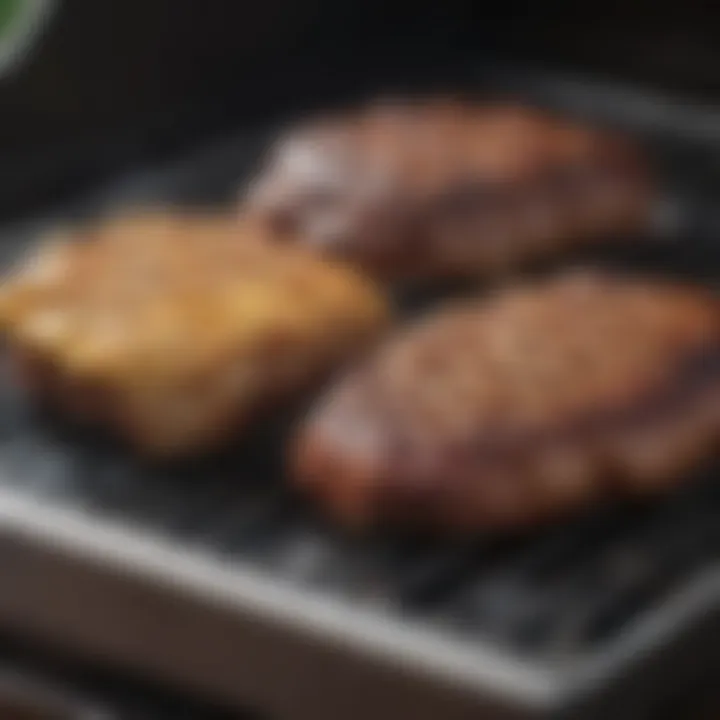
The process of using a brush is straightforward. After the grill has cooled slightly post-cooking, scrub the grates thoroughly. This can prevent flavor contamination and reduce the risk of grease fires, essential for safe grilling.
Cleaning Solutions
Choosing the right cleaning solution is crucial for maintaining a clean grill. While some people opt for commercial grill cleaners, others prefer natural alternatives. Chemicals can be effective but may leave harmful residues that can affect your food. Natural solutions such as vinegar and baking soda can be equally effective and safer for the environment.
When using cleaning solutions:
- Spray the solution on the grates and other surfaces.
- Allow a few minutes for the solution to break down grease.
- Follow up with thorough scrubbing using your brush or scraper.
Always check for compatibility with your grill material. Some solutions might damage specific finishes or coatings. Making informed choices about cleaning solutions can ensure good grill hygiene without compromising safety.
Protective Gear
Cleaning your grill involves various tasks that can expose you to harmful substances. It’s important to wear protective gear to keep yourself safe. Gloves are crucial to protect your hands from chemicals and sharp objects. Safety glasses are also wise to prevent any debris from irritating your eyes.
When cleaning, consider the following protective gear:
- Chemical-resistant gloves to avoid skin irritation.
- Eye protection to shield against splashes from cleaning solutions.
- Non-slip shoes to provide stability when working around the grill.
Proper protective gear ensures that you can clean effectively while minimizing the risk of injury. Being meticulous about your safety can transform the task of grill cleaning into a more manageable and secure process.
Best Practices for Grill Cleaning
Cleaning your grill after each use is not just a suggestion; it is a vital practice for maintaining both the appliance's functionality and your health. Implementing best practices ensures that your grill remains in optimal condition, extending its lifespan and enhancing the flavors of your grilled foods.
Regular Cleaning Schedule
Establishing a regular cleaning schedule is essential. It helps you stay on track with maintenance and prevents the buildup of grease and residue. Ideally, every time you use the grill, you should perform a quick clean immediately after cooking. This includes scraping grates to remove food particles and wiping down surfaces. A weekly deep clean is also recommended. This involves a more thorough disassembly and cleaning of parts. Consistency is key, as it prevents the grill from becoming a breeding ground for bacteria.
Utilizing a Grill Cover
Using a grill cover is important for protecting your appliance from environmental factors. A good cover keeps dirt, dust, and moisture from accumulating on the grill. When you cook outdoors, weather can be unpredictable. Rain, humidity, and sunlight can degrade external parts of your grill over time. Therefore, investing in a high-quality, durable cover is a simple yet effective practice to prolong its life and maintain cleanliness.
Yearly Maintenance Checks
Conducting yearly maintenance checks is crucial. Take the time to inspect all components of your grill. Look for signs of wear, such as cracks in the burners or rust on the surfaces. Regular checks allow you to address minor issues before they lead to bigger problems. This thorough inspection should also include cleaning the interior parts, such as the grease trays and burners. By keeping your grill well-maintained, you ensure not only safety but also that you will continue to enjoy rich flavors during your grilling sessions.
Summary: A meticulous approach to cleaning your grill contributes immensely to health, flavor, and equipment longevity. Regular schedules, protective coverings, and yearly checks form a robust strategy for grill maintenance.
Environmental Considerations
Cleaning your grill after each use is not only crucial for health and performance but also has significant environmental implications. Many people do not realize how their grilling habits can affect the surrounding ecosystem. Understanding these considerations can lead to more sustainable practices that benefit both the individual and the planet.
Waste Disposal Practices


When cleaning a grill, the waste generated must be disposed of properly to minimize environmental harm. Used oils, food residues, and cleaning agents can be harmful if not discarded properly. Here are some essential practices for waste disposal:
- Avoid dumping fats and oils directly into the sink or drains. Instead, collect them in a container and dispose of them with kitchen waste or at a designated disposal site.
- Compost organic matter such as vegetable scraps, as they can enrich soil rather than contribute to landfill waste.
- Research local disposal regulations for harmful materials. Many regions have special provisions for hazardous waste, and following these guidelines protect your local wildlife and waterways.
Implementing these practices not only aids in keeping the environment clean but also promotes a responsible lifestyle.
Eco-Friendly Cleaning Products
The types of cleaning products used to maintain a grill can have a substantial impact on the environment. Conventional cleaning agents often contain chemicals that are harmful to aquatic life and contribute to pollution. It is wise to choose eco-friendly cleaning solutions whenever possible. Here are some alternatives:
- Vinegar and Baking Soda: A simple mixture of vinegar and baking soda can efficiently clean without harsh chemicals.
- Citrus-based cleaners: These are biodegradable and do not leave harmful residues behind.
- Plant-based soaps: Opt for soaps labeled as biodegradable and environmentally safe, ensuring they break down without harming the ecosystem.
Utilizing these eco-friendly cleaning products helps reduce the ecological footprint of your grilling activities. It is a step towards preserving the environment for future generations.
"Taking small measures in cleaning practices can lead to significant positive changes for our environment."
Common Mistakes in Grill Cleaning
Cleaning a grill is a necessary task for those who appreciate the art of grilling. However, many individuals overlook fundamental practices that can severely affect the grill’s condition and the quality of food. Understanding the common mistakes can help in establishing an effective cleaning routine.
Mistakes made during the cleaning process can lead to various issues, including contamination of food, reduced grill performance, and even safety risks. Recognizing these errors is paramount for both optimal grilling experiences and maintaining the integrity of the grill.
Neglecting to Clean After Each Use
One of the most critical mistakes is neglecting to clean the grill immediately after use. Each cooking session leaves behind grease, food remnants, and other residues that can harbor bacteria and affect future cooking. If you allow grime to build up, it becomes significantly harder to remove later.
Grilling equipment thrives on regular maintenance. Cleaning your grill after each use provides several benefits:
- Maintaining Hygiene: Food residues can become breeding grounds for bacteria, posing health risks.
- Preserving Flavor: Charred bits from previous cookouts can impart unwanted tastes to fresh food.
- Enhancing Grill Longevity: Regular cleaning prevents corrosion and preserves the overall integrity of the grill.
Taking just a few moments to scrape down the grates and perform a quick wipe can save significant effort in the long term. The essential takeaway here is to prioritize post-cooking cleanup, creating a habit that will benefit not just your grill but also your culinary outcomes.
Using Abrasive Materials
Another common mistake is the use of abrasive materials during the cleaning process. While it may seem practical to use steel wool or harsh scrubbing pads, these tools can scratch and damage surfaces. This leads to a couple of problems. Scratched surfaces can harbor bacteria, making cleaning more challenging in the future.
Instead of abrasive cleaners, consider gentler options that are equally effective. Here are alternative approaches:
- Soft-Bristle Brushes: Use a grill brush designed with softer bristles to avoid scratching grates.
- Vinegar and Baking Soda: These natural cleaners provide effective cleaning power without damage.
- Microfiber Cloths: These are excellent for wiping down surfaces without scratching or leaving lint.
Ultimately, the goal of cleaning is to keep the grill in optimal working condition while ensuring safety. It is best to invest in the right tools that align with good maintenance practices. Being mindful of what you use can prevent long-term damage and save money in repairing or replacing parts of the grill.
Ending
Cleaning your grill after each use is not merely a chore; it represents a fundamental aspect of responsible grilling practice. This conclusion synthesizes the various elements discussed throughout the article, highlighting their significance for food lovers. The process of maintaining a clean grill enhances safety, improves food flavor, and prolongs the lifespan of the appliance.
Summary of Key Points
- Health Safety: Regular cleaning eliminates harmful bacteria and reduces the risk of cross-contamination. These practices protect you and your loved ones from foodborne illnesses.
- Flavor Enhancement: Clean grates ensure that the flavors remain intact. Residual burned food can lead to unwanted tastes in your dishes.
- Longer Appliance Life: A well-maintained grill operates efficiently, preventing wear and tear that could result in costly repairs or replacements.
- Environmental Care: The choice of cleaning products also matters. Using eco-friendly solutions reduces your impact on the environment.
Final Thoughts on Grill Hygiene
In essence, the importance of grill hygiene cannot be overstated. A clean grill not only promotes a safer cooking environment but also contributes to a superior culinary experience. By adopting a cleaning routine, you are investing in both your health and the quality of the meals you prepare. Remember, the effort you put into grill maintenance reflects directly on your dining experience. A few moments taken after each use can lead to years of enjoyable grilling. For the discerning chef, proper cleaning is not just a best practice; it is essential.







